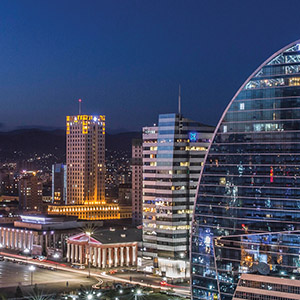In 1960’s socialist idea spread dynamically in South America, and left forces started to take power in almost all countries. In Chile, S. Alende won the election in his fourth attempt and nationalized land, industries, mines, shops and all entities and expelled foreign companies from the country in just a few years. These actions were followed by economic instability and shortage of food and consumer goods, resulting economic bankruptcy. In 1973 there was a military coup d’état and the President was shot in the Government house and all those of socialist idea were arrested and chased and hanged.
Military leader Augusto Pinochet appointed a number of young ministers, graduates of the Chicago school of economics (US) who had studied market economy theory and returned all confiscated property to their owners back and reestablished market economy relations and invested huge amount of capital to infrastructure development and managed to stimulate economy.
Economic restructuring, which Augusto Pinochet brought during his twenty six years of military rule at the expense of thousands lives of his countrymen, has been in introduced in Mongolia in peaceful way. If we Mongolians study the reforms he made, understand and adapt into our conditions, then we can achieve higher results in our socio-economic development, but not at the expenses of human lives and freedom, as this dictator has done.
It is worth to point out two major works of the Pinochet government, which played an exceptional important role in the present achievements of Chile. This is the introduction of innovation based economy and the amendment of the Constitution, ensuring fair, stable government and continuity in character of power. As for the first work is concerned, new government of Chile has concluded in 1974 an agreement on the compensation of US$87 million to ITT (International Telephone and Telegraph) of the USA. It was agreed that if the compensation money would be invested in Chile, especially in “scientific and technology research and development, and their integration into the economy” then the government of Chile would match the fund into all projects.
Thus how the first public private partnership (PPP), a nonprofit development fund was created, laying foundation for the present magnificent achievements, diverting mining revenue toward the socio-economic development through the diversification of economy. This was base for industrialization and defining socio-economic development guideline and developing innovation based economy.
The board of the “Foundation Chile” is composed of government and private sector representatives and it operates like a private company. Many private companies have become its donors. BHP, the major investor of the largest copper producing country has contributed to the fund recently US$20 million and has been collaborating to create competitiveness in the country’s economy.
Today, the Stability fund Chile has been allocated in off-shore and economic reform researches are been funded by the interests of the fund.
The next tangible work was the Constitution, formulated by Pinochet in 1980. This Constitution, formulated by the dictator is still in force today, ensuring stability of government, preserving continuity of governments’ accomplishments and enriching with new contents from the new one. So far five governments have served the country after Pinochet.
The Chileans have just copied their Civil law from French one. The legislative power (Congress) is vested on two Chambers. Senate or the upper chamber consists of 38 members, elected for 8 years and partial election in every four years. Chamber of Representatives or lower chamber consists of 120 members, elected at every four year. President is the head of Executive power.
At this time, when Mongolian society is actively engaged in discussion, regarding the productivity-based economy development principle and an efficient governance structure, it is useful to study the above said two works and creatively reflect in our future activities.
UB POST
May 7,2010







